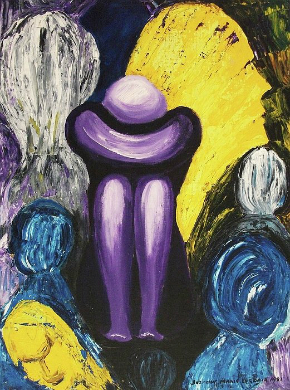John's prologue and God's rejected children
 |
| Rejection, by Suzanne Marie Leclair. |
The prologue to John’s Gospel has always been foundational to traditional Christian theology. In its language of the transcendent, eternal Logos, it has provided a basis for seeing Christ as equal to God and as the second person of the Trinity. Its principal theme, the Incarnation, has been a cornerstone for understanding God’s revelation in Christ, God’s love for the material creation, and the nature of Jesus Christ as both human and divine. I continue to cherish these themes as central to the Christian faith. Nevertheless, I think that John’s prologue has much more to say. In speaking about this Word become flesh, it also speaks powerfully to us about what it means to be human. Over the years, I kept returning to a few verses that changed the way that I saw the entire prologue and which consequently changed my entire theology.
The words of John 1:11 kept jumping out at me: “He came to what was his own, and his own people did not accept him” (NRSV). Rejection. In the middle of this lofty passage about creation, light, and incarnation, there is the profoundest and most intimate of rejections. Not only was the Word not recognized by the world they[1] had created (1:10), the Word was not accepted by her own home and the people closest to her (1:11). This deep rejection caught my attention, but the verses that proceeded it also captivated me: “But to all who received him, who believed in his name, he gave power to become children of God, who were born, not of blood or the will of the flesh or of the will of man, but of God” (1:12-13). In the midst of rejection, the text also speaks about this rejected one giving power to people to become children of God on a basis that transcends biology and purity. Radical rejection followed by radical inclusion and acceptance. What does all of this say about the various ways in which God’s children are rejected today?




